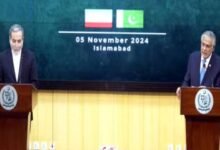The growth rate in the first half (April-September) works out to be 7.7 per cent.
Indian economy recorded a growth of 7.8 per cent in the first quarter (April-June 2023-24) and 7.6 per cent in the second quarter (July-September 2023-24).
Industry expects the economy to grow at 7.5 to 8 per cent in the current fiscal and 8 per cent in 2024-25 on the back of strong growth momentum, positive sentiments and rising private investments, Anish Shah, newly-elected president of the Federation Indian Chambers of Commerce and Industry (Ficci), said on Monday.
There will, however, be geopolitical pressure points that may have a bearing on India’s growth prospects, he added.
“We have seen great growth numbers so far at 7.8 per cent, 7.6 per cent. I expect that to continue because we have got strong momentum. We are seeing multiple companies investing, adding capacities, something that Mahindra group has done as well.”
“We expect that growth momentum to continue at 7.5 per cent to 8 per cent in the current financial year and for next year, I would expect 8 per cent or higher,” said Shah, who is also Group CEO and Managing Director of Mahindra and Mahindra, in an interview to PTI.
Indian economy recorded a growth of 7.8 per cent in the first quarter (April-June 2023-24) and 7.6 per cent in the second quarter (July-September 2023-24). The growth rate in the first half (April-September) works out to be 7.7 per cent.
On the pressure points on the economy, Shah said, “primary pressure points are outside India. We are seeing stress with regard to Israel and Gaza, added to what is happening in Ukraine. Our hope is that it does not expand or accelerate any further from there. For the sake of everyone, it gets to peace.”
The second concern, he added, was the economic problems being faced by the western countries.
“We don’t think that the problems there have abated as yet. Interest rate there has been at a much higher level than what we have seen here in India. If there is a greater economic impact in the western world, it will impact India. We see those as two major concerns,” Shah added.
The government, he said, needs to continue the momentum of growth to tide over the problems emanating from abroad. Moreover, he added, many Indian companies have deleveraged balance sheets and they should be prepared to play a bigger role in case the world witnesses an economic crisis.
As regards Indian companies, Shah said, “the sentiment is positive, investment is picking up and capacity addition is going on…The pace of investment will accelerate further, as demand continues and growth continues in the economy.”
Answering questions on Reserve Bank’s decision to keep the interest rate unchanged for fifth time in a row, the new Ficci chief said, “one needs to give lot of credit to RBI for being pro-active, because they have acted early. That has helped. More important factor is to have inflation under control, than to reduce rates. It has worked so far. I would rely on the experts of the RBI to manage the economy which they have done very well so far.”
He further said that once the economy is set on a good track with longer term perspective and there is room for rate cut, ”industry would welcome it at that point”.
The Reserve Bank, it may be mentioned, has not tinkered with the short-term interest rate (repo) since February 8, 2023. It kept the interest rate unchanged at 6.5 per cent for the fifth time in a row at its bi-monthly monetary policy review which was announced earlier in the month.
The focus of the Ficci activities, Shah said, would be on Make in India initiative, women-led development, farm prosperity and sustainability to help the nation propel towards the goal of ’Viksit Bharat’ by 2047.
(This story has not been edited by News18 staff and is published from a syndicated news agency feed – PTI)







